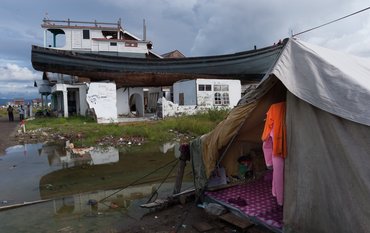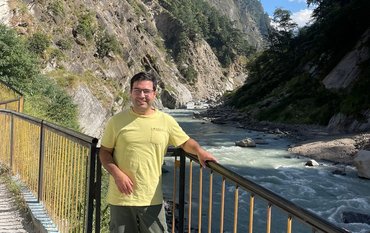On 16.12.2025, the Nepalese Foreign Minister, Dr Arzu Rana Deuba visited the GFZ German Research Centre for Geosciences. She was accompanied by her staff and the Nepalese Ambassador to Germany, Dr Shail Rupakheti. During the talks, further steps were agreed to intensify cooperation between the GFZ and Nepal in disaster prevention and early warning.
Dr Ludwig Stroink, Head of “Projects and International Affairs” at the GFZ, welcomed the delegation on behalf of the Scientific Director, Prof Susanne Buiter, and presented the broad scientific spectrum of the GFZ. The focus of the meeting was the presentation of an innovative early warning system by Prof Niels Hovius, Head of the Geomorphology Section. This system, based on establishing a nationwide network of seismological stations, offers far-reaching possibilities for early warning of natural disasters in Nepal.
In particular, it is used for early or real-time warning of landslides, glacier and debris slides and flash floods. This would enable timely warning, particularly in mountainous regions that are difficult to access, and thus not only save human lives but also minimise severe infrastructural damage, such as dams for power generation - and at comparatively low cost. Evacuation measures can be taken, or floodgates of dams can be opened to minimise damage to infrastructure and human life. The existing seismological network, primarily used to analyse earthquakes, will also be strengthened.
An essential component of such an early warning system is civil society's involvement in covering the so-called "last mile" in the warning chain. Providing timely and adequate information to the affected population requires comprehensive local involvement.
During the talks, it was agreed that the various aspects of cooperation with Nepalese institutions should be further concretised in a coordination meeting supported by the Nepalese Ministry of Foreign Affairs. This meeting will provide a platform to maximise the synergies between science, government, and society and drive the implementation of the system forward.
The delegation was impressed by the approaches presented and emphasised the importance of close cooperation with the GFZ to support Nepal in overcoming its geographical and climatic challenges.





![[Translate to English:] Fire in a forest, smoke rising, aerial view from above](/fileadmin/_processed_/8/3/csm_2025_01_06_AdobeStock_415831729_5a0e6d50d3.jpeg)








![[Translate to English:] [Translate to English:] Abror Gafurov von dem Schriftzug "Welcome to Azerbaijan" und den UN und COP Logos](/fileadmin/_processed_/2/5/csm_2024_11_Baku_COP29_Abror_Gafurov_1042faec82.jpeg)


![[Translate to English:] Martin Herold standing in front of the library on the Telegrafenberg](/fileadmin/_processed_/c/d/csm_Martin_Herold_d385ee4dd9.jpeg)
![[Translate to English:] Many people are listening to a presentation in the GFZ lecture hall.](/fileadmin/_processed_/c/a/csm_1_Bild1_hell_b9c0e9f5ed.jpeg)






![[Translate to English:] Both scientists sitting on stools in front of a wall of books in the Telegrafenberg library](/fileadmin/_processed_/6/6/csm_Buiter_Castell_DORA_4_e87cb1ea18.jpeg)
![[Translate to English:] Gruppenbild mit 4 Personen](/fileadmin/_processed_/8/d/csm_20241017_GFZ-Emmerman-Medal-005_web_reinhardtundsommer_21a414fa4a.jpeg)






![[Translate to English:] Ice landscape with five red tents](/fileadmin/_processed_/8/9/csm_Zeltlager_auf_dem_Eis_Urheberin_Jenine_McCutcheon_5ced2d523b.jpeg)
